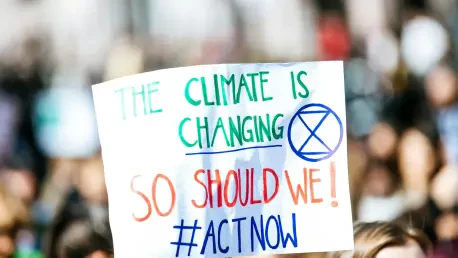In a move that has sent shockwaves through environmental and scientific communities, the Environmental Protection Agency (EPA) under the Trump administration has unveiled a proposal to rescind the greenhouse gas endangerment finding, a cornerstone of U.S. climate policy established in 2009. Announced on July 29 by EPA Administrator Lee Zeldin, this rollback aims to strip the agency of its legal authority to regulate emissions directly linked to global warming. At a time when the devastating impacts of climate change—ranging from intensifying wildfires to rising sea levels—are becoming impossible to ignore, such a policy shift raises profound concerns. The proposal not only challenges decades of scientific consensus but also threatens to unravel critical regulations that protect public health and the environment, setting the stage for a heated debate over the nation’s commitment to addressing one of the most pressing issues of our era.
Scientific and Legal Foundations Under Threat
Challenging Established Science
The EPA’s proposal directly confronts a vast body of scientific evidence that has long affirmed the dangers of greenhouse gases like carbon dioxide in driving climate change. This consensus, built on decades of peer-reviewed research, has been a guiding force for environmental policy, yet the current administration leans on a controversial Department of Energy report authored by climate skeptics to justify its stance. Critics have sharply dismissed this report as lacking credibility, pointing to its divergence from federal assessments like the U.S. Fifth National Climate Assessment, which details the accelerating risks of unchecked emissions. The rollback’s dismissal of established science is seen by many experts as a deliberate attempt to undermine the foundation of climate action, prioritizing ideological positions over empirical data at a critical juncture for global environmental efforts.
Beyond the rejection of scientific consensus, the proposal signals a broader shift in how evidence is valued within policy-making circles. Environmental advocates argue that sidelining rigorous research in favor of disputed claims sets a dangerous precedent, not just for climate policy but for other areas reliant on scientific input. The U.S. Fifth National Climate Assessment, among other authoritative sources, warns of escalating threats like extreme weather and biodiversity loss if emissions are not curbed. By ignoring such findings, the EPA risks eroding public trust in governmental institutions tasked with safeguarding the environment. This move has sparked alarm among scientists who see it as a formalization of climate denial, potentially delaying urgent action needed to mitigate worsening global impacts.
Legal Bedrock at Risk
At the heart of the EPA’s authority to regulate greenhouse gases lies the endangerment finding, a legal pillar rooted in the 2007 Supreme Court ruling in Massachusetts v. EPA. This landmark decision affirmed that the agency is obligated under the Clean Air Act to address emissions that endanger public health and welfare, providing a robust framework for climate regulations. The current proposal to rescind this finding threatens to dismantle that authority, effectively halting the EPA’s ability to impose limits on major pollution sources like the transportation sector. Legal scholars have described this rollback as a direct assault on established precedent, warning that it could render the agency powerless to act on one of the most significant environmental challenges facing the nation.
The implications of losing this legal foundation extend far beyond immediate regulatory setbacks. Without the endangerment finding, future administrations may struggle to reinstate emissions controls, creating a long-term gap in climate governance. Critics argue that the proposal lacks a defensible basis in law, given the Supreme Court’s clear directive and the extensive documentation supporting the original finding. This move is seen as an attempt to prioritize industry interests over legal obligations, potentially inviting a wave of litigation from environmental groups determined to preserve the EPA’s mandate. The erosion of such a critical legal tool could redefine the scope of federal environmental protection for years to come, raising questions about accountability in addressing global warming.
Health and Environmental Consequences
Public Health Crisis Looming
The potential health consequences of the EPA’s proposed rollback are staggering, with experts warning of a significant rise in pollution-related illnesses if regulations are dismantled. Environmental and public health advocates, including voices from the American Lung Association, highlight that rescinding vehicle emission standards and other controls could lead to thousands of premature deaths annually. Increased exposure to pollutants is projected to cause millions of additional asthma attacks, particularly affecting vulnerable populations like children and the elderly. Such outcomes underscore the direct link between greenhouse gas emissions and widespread health crises, painting a grim picture of the human toll that could result from prioritizing deregulation over societal well-being.
Further compounding these concerns is the strain on healthcare systems that would likely follow an uptick in respiratory and cardiovascular conditions tied to poor air quality. Data consolidated from groups like the Environmental Defense Fund (EDF) suggests that the rollback would exacerbate existing public health disparities, hitting communities near high-emission zones the hardest. The loss of stringent emission rules, which have historically curbed pollutants from major sources like transportation, threatens to reverse decades of progress in improving air quality. This policy shift has ignited fierce opposition from health professionals who argue that the cost of inaction will be measured in lives lost and a diminished quality of life for millions, urging a reconsideration of the proposal’s dire implications.
Environmental Damage Amplified
On the environmental front, the EPA’s proposal could unleash catastrophic levels of climate pollution, with projections estimating an additional 10 billion tons of emissions by 2055 if the rollback proceeds. Such a surge would intensify global warming, accelerating phenomena like rising sea levels, more frequent and severe extreme weather events, and widespread habitat destruction. The urgency of curbing emissions is reinforced by federal reports that detail how current trends are already pushing ecosystems to their limits. Environmentalists warn that this policy would not only undermine national efforts to mitigate climate change but also hinder global initiatives at a time when collective action is paramount to averting disaster.
The cascading effects of increased emissions would also threaten biodiversity on an unprecedented scale, disrupting delicate balances in natural systems. Forests, oceans, and wildlife that serve as critical carbon sinks could face irreversible damage, further compounding the climate crisis. The rollback’s potential to derail progress toward emission reduction targets is a major concern for international partners who rely on U.S. leadership in environmental stewardship. By stepping back from regulatory commitments, the nation risks exacerbating global environmental challenges, from glacier melt to desertification. Advocates stress that the long-term consequences of such inaction would far outweigh any short-term economic gains touted by supporters of the proposal, calling for sustained regulatory frameworks instead.
Economic and Global Implications
Economic Fallout for Consumers and Industry
Economically, the EPA’s rollback poses significant risks to both consumers and the broader U.S. market, particularly in the realm of clean transportation, a sector valued at $10 trillion globally. Repealing vehicle emission standards could lead to a sharp increase in gas prices, with the agency’s own analysis projecting a rise of nearly 75 cents per gallon. Such cost hikes would burden everyday Americans, offsetting any perceived financial relief from deregulation. Additionally, the policy threatens to undermine the nation’s competitive edge in an industry increasingly driven by innovation in sustainable technologies, potentially costing jobs and economic opportunities in a rapidly evolving market.
The broader economic ramifications include a potential loss of investor confidence in U.S. environmental commitments, which could deter partnerships and funding for green initiatives. By stepping away from stringent emission rules, the country risks ceding leadership to other nations that are aggressively pursuing clean energy and transportation solutions. Experts argue that this move prioritizes short-term gains for specific industries, like fossil fuels, over long-term economic stability and growth in emerging sectors. The financial toll on consumers, combined with diminished market positioning, paints a troubling picture of the rollback’s impact, prompting calls for policies that balance economic needs with environmental responsibilities.
Global Leadership in Jeopardy
The polarized reactions to the EPA’s proposal reflect a deeper struggle over the U.S. role in global climate action, with significant implications for international credibility. Industry supporters, such as the American Petroleum Institute, frame the rollback as a necessary rejection of unrealistic regulations, arguing that it frees businesses from burdensome costs. However, environmentalists and scientists counter that this stance represents a dangerous retreat from responsibility, especially given the nation’s status as the second-largest current emitter of greenhouse gases. This divide underscores a critical tension in how the government balances domestic priorities with its obligations on the world stage, raising concerns about diminished influence in climate negotiations.
Internationally, the rollback could weaken the U.S. position as a leader in addressing climate change, potentially emboldening other nations to scale back their own commitments. Critics warn that such a policy shift sends a discouraging signal at a time when global cooperation is essential to combat escalating environmental threats. The loss of trust from allies who expect the U.S. to spearhead ambitious climate goals could hinder collaborative efforts, from technology sharing to funding for mitigation projects. As the world grapples with the urgent need for unified action, this proposal risks positioning the nation as a laggard, prompting renewed debate over the importance of maintaining a strong, science-based stance in global environmental policy.
Reflecting on a Pivotal Policy Moment
Looking back, the EPA’s push to rescind the endangerment finding stood as a defining chapter in the struggle over climate policy, revealing stark divisions between scientific consensus and political agendas. The intense opposition from health advocates, environmentalists, and legal experts underscored the profound risks that unfolded during this debate, from heightened pollution to eroded global standing. Moving forward, stakeholders were urged to prioritize actionable solutions, such as reinforcing legal protections for emission controls through legislative measures and fostering public-private partnerships to drive innovation in clean technologies. Strengthening international alliances to uphold climate commitments emerged as a critical step, ensuring that past setbacks did not derail future progress. This moment served as a reminder of the need for vigilance and collaboration to safeguard environmental and public health gains against the tide of deregulation.









